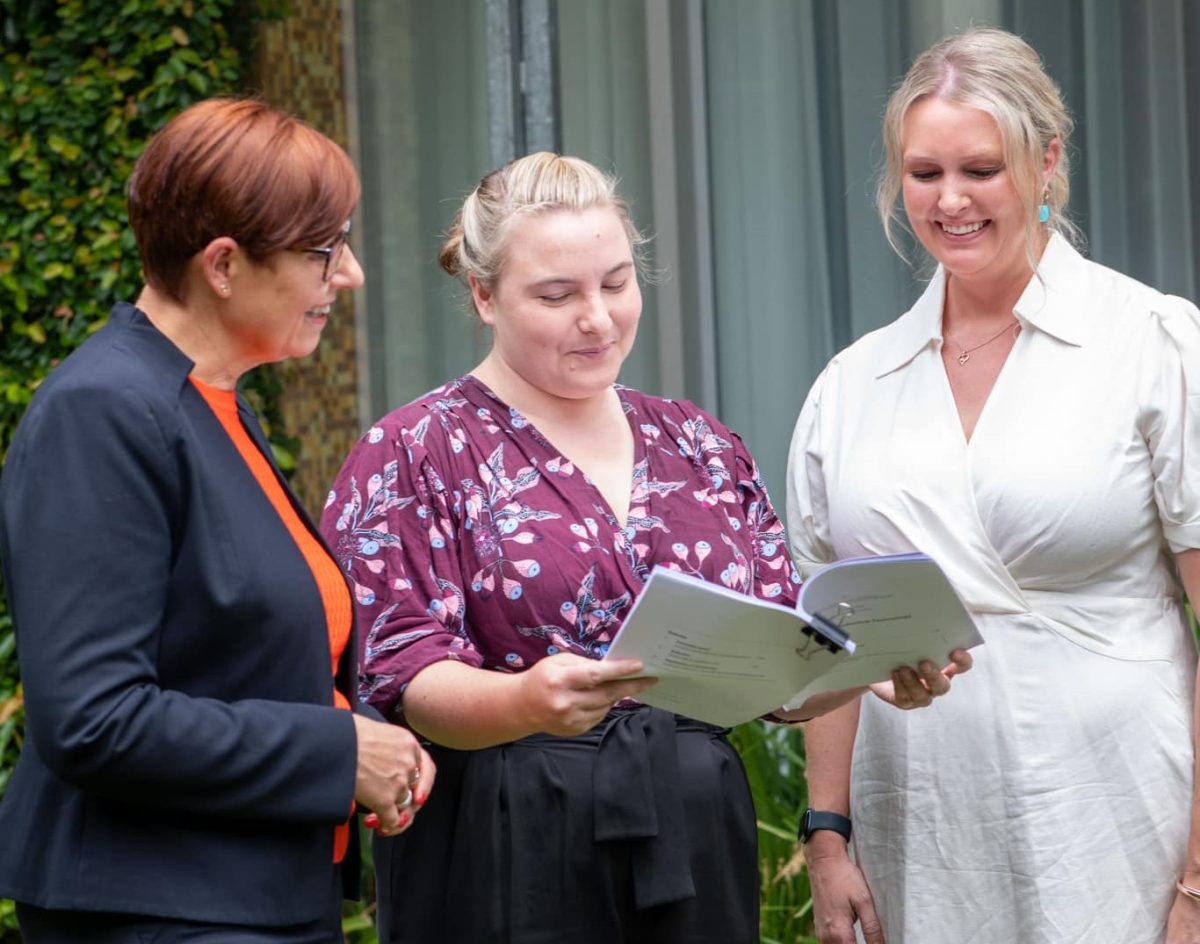
Donor Conceived Australia ACT lead Eleni McIlroy (centre, pictured with Rachel Stephen-Smith and Marisa Paterson) said a donor register “could be life-changing”. Photo: Rachel Stephen-Smith Facebook.
The ACT Government has introduced legislation that will give people conceived from anonymous egg or sperm donors the right to know who their biological parents are.
The Assisted Reproductive Technology Bill 2023 provides a legislative framework to regulate clinical and ethical standards for the ACT’s three assisted reproductive technology clinics and establish a voluntary donor register that will enable donor-conceived people to access information about their genetic heritage, including information about their donor, should they wish.
The bill will also limit the number of families a donor can contribute to and will later introduce a retrospective register of donor information, regardless of when someone was conceived or born.
The legislation would bring the ACT in line with other jurisdictions such as Victoria, NSW and WA, which have already introduced their own laws around donor conception.
Introducing the bill on Tuesday, Health Minister Rachel Stephen-Smith said the legislation tackles the “culture of secrecy” that has surrounded donor conception, which often means people don’t find out until adulthood – if at all – that they were donor-conceived.
“We have heard from donor-conceived individuals that they can experience barriers when trying to gain information, causing a lot of frustration and distress,” she said.
As a result, many donor-conceived people do not have access to their genetic heritage or knowledge of hereditary medical conditions and face anxiety and stress about their intimate relationships.
The bill was driven by Marisa Paterson, who moved a motion in the Assembly in 2021 to review the available support and regulatory services for assisted reproductive technology in the ACT.
Dr Paterson said she became a “passionate advocate” for the issue after meeting with donor-conceived people in the ACT and hearing their “incredibly powerful stories”.
Dr Paterson has previously shared some of these stories with the Assembly, including that of a 33-year-old Canberra woman, Kirrily, who was donor-conceived.
“Growing up as a teenager in Canberra, I was very conscious of dating or having an intimate relationship with others for fear that I could potentially have a consanguineous relationship without knowing,” Kirrily said.
“Ultimately, I was right to be extremely cautious when dating because I have three older half-brothers within a small community of Canberra that I was unaware of.”
Dr Paterson also shared the story of a mother, Gail, whose daughter, Lola, was conceived with a US sperm donor at a Canberra fertility clinic that had advised her at the time that a maximum of five families may have used the donor.
The mother decided to investigate whether her daughter had any siblings and discovered there were many more than five living around the world.
“My 11-year-old daughter Lola has 103 siblings, and they are just the ones we know about,” she said.
“The reality is that Lola’s sibling count is probably something closer to 200. We’ll never know the truth, and neither will the Australian fertility clinic or the sperm bank that helped me create her.”
Donor Conceived Australia ACT team lead Eleni McIlroy said, “We’re seeing sibling groups of over 1000 across the world”.
“This is a situation nobody would want to be in. You cannot form meaningful relationships, you cannot connect, you also cannot feel safe navigating the world and forming relationships with people,” she said.
Ms McIlroy, who is donor-conceived herself, said for donor-conceived people who don’t know their background, finding out about their biological parent(s) can be “nigh impossible” without a register.
“It’s an awful feeling for our members to have an entire system work against them and tell them that they don’t deserve the same information that everybody else has.
“We deserve equal emotional connection, equal treatment of our rights to connect with our half-siblings, our donors themselves,” she said.
“Everything you think about your life and value about your family, it’s about making that component fully available to us.”
Ms McIlroy said although the donor register would be voluntary for now, she strongly encouraged donors to add their information.
“This could be life-changing for somebody here in this community,” she said.












